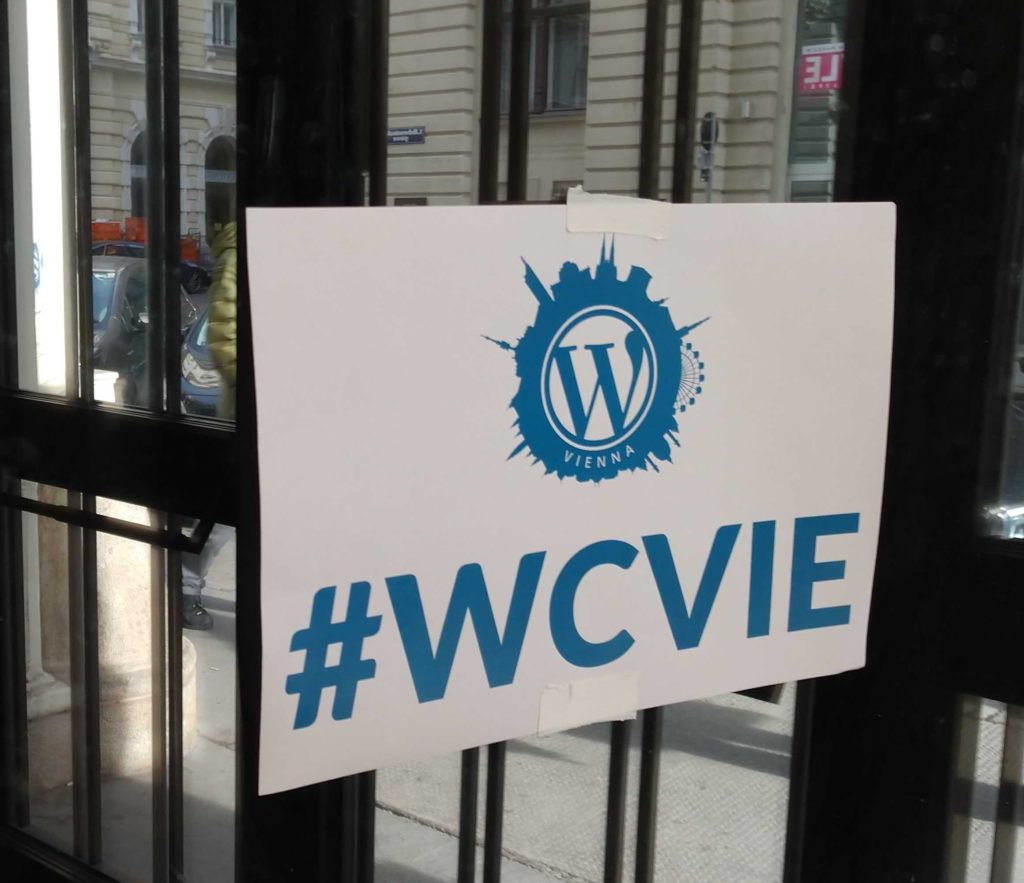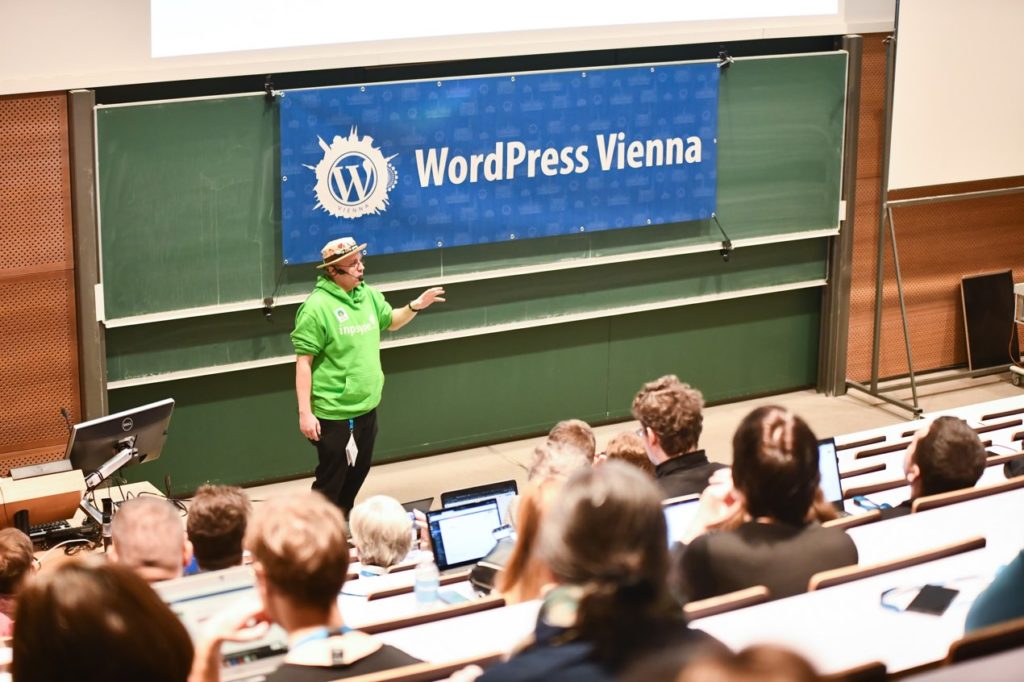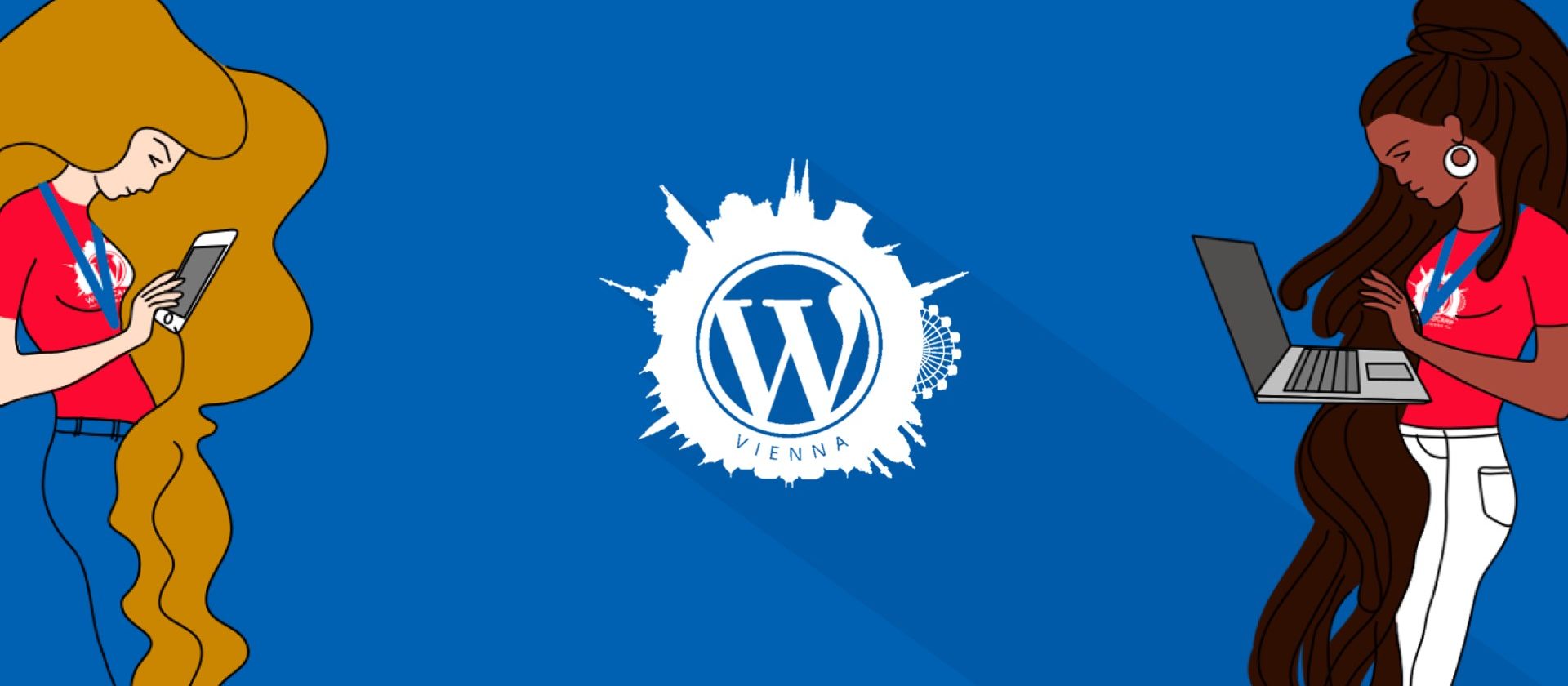From 15 to 16 February 2020, about 300 WordPress enthusiasts from all over the world met on the campus of the University of Vienna. There was no reason for boredom at the WordCamp Vienna with about 20 talks around the topic WordPress. Inpsyde CIO Robert Windisch was there and tells in this article about his impressions and his talk about multilingualism in WordPress.
Destination: Austrian WordPress Community

After a few years, I was once again at a WordCamp in Vienna. Last time it was the WordCamp Europe 2016 in the Museumsquartier in Vienna with about 2000 visitors. At WordCamp Vienna 2020 there were about 300 visitors, but it was not less exciting. As one of the people responsible for the German language in WordPress, the whole DACH area is important to me. Unfortunately, it had never been enough for a visit to a normal WordCamp in Austria until now.
That’s why I was all the more pleased that my talk on multilingualism in WordPress was accepted.
The WordPress Community and Inpsyde
The topic of multilingualism in WordPress has been with me for many years. Also, Inpsyde is very interested in this topic, because we helped to build up the German community and to translate WordPress into German in the beginning. The WordPress Community is a part of us, our foundation so to speak.
Therefore it is important to us to continue to help the community and to maintain direct contact. For this reason, it was very important to me to join the WordCamp Vienna.
Since I didn’t have much contact with the Austrian community so far, one of my main goals was to strengthen the cooperation between the Austrian and the German community. And that was very successful!
Translating WordPress: For a Borderless Community
WordPress as an Open Source project lives from the participation of the community. And this community is not limited to certain countries, it is international. The translation of WordPress is therefore immensely important for efficient collaboration.
As a Locale Manager for German, I am always looking for support in the translation of WordPress. I have found it in the Austrian community. There was also great progress with the translation of WordPress into Austrian. Before WordCamp Vienna, there was only one Locale Manager for Austria. Now there are already three!
Furthermore, we could use our time at the Contributor Day on the second day of WordCamp Vienna very efficiently by introducing a new FAQ section on the Austrian WordPress site. So, the WordCamp Vienna was a complete success!
The international cooperation and the overcoming of linguistic borders let us grow as a community.
Everyone can contribute!
The topic of participation is extremely important for the future of WordPress. Because the more people help to improve and shape WordPress, the more WordPress will be able to meet our needs.
For this reason, I held a talk at the Contributor Day of the WordCamp Vienna with the topic Contributing 1o1: How to start contributing to WordPress. I gave tips on how to start contributing to the active WordPress community and was very happy that so many were interested!
Everyone can help to make WordPress even better! Here you can find all important information.
Multilingualism in WordPress

In my presentation at WordCamp Vienna, I had a talk on the topic of multilingualism in WordPress. Here are a few of my core statements:
The Status of Multilingualism in WordPress
Because the community consists of many individuals, accessibility is one of the most important issues in the WordPress universe. WordPress should be accessible to everyone. This requires a lot.
One aspect that should not be underestimated is the overcoming of language barriers. Because we know that the majority of WordPress installations have been localized for several years. And meanwhile, over 35% of the web is powered by WordPress.
German and other translations of WordPress have significantly increased the market share of WordPress.
The growing importance of multilingualism can also be seen in the fact that features for multilingualism are planned in the WordPress basic installation (without plugins or special themes). Read here how these future plans look like and how they could influence multilingualism in WordPress.
There are already many plugin solutions for multilingual websites in WordPress. For example, if you want to align your own online shop to different country markets, you have the agony of choice, so to speak.
Multilingual Website: When does it make sense?
But the most important question regarding multilingual websites for businesses is: Does a multilingual website make sense at all? To answer this question, you should first ask yourself the following question: Am I or the company ready for the market? This includes, for example, the setting of shipping methods, costs, payment solutions, and to provide a support staff who speak the respective language.
In addition: Translation goes beyond localization! Every language has its own peculiarities that can be easily overlooked when translating content word for word. For customer loyalty, however, a translation that looks as serious and natural as possible is of great importance.
Multisite: The Best Way to a Professional Multilingual Website
Finding the right multilingual solution is difficult because there are so many possibilities. But for professional corporate sites, I clearly recommend a multisite solution. A multisite contains several pages within a single WordPress installation. This allows the creation of separate pages on the network for each language. One of the biggest advantages of this solution is the high performance and customization possibility this provides. All advantages and also disadvantages of the Multisite can be found here.
Conclusion: Wordcamp Vienna 2020
The WordCamp Vienna was a great experience for me and I was able to make contact with many members of the Austrian community. We also got a lot going, including support for the Translate WordPress project and the FAQ section of the Austrian WordPress site.
There are great ideas in the Austrian community and we still have a lot to expect. I will definitely keep in touch with them.
In the future, there are also plans for closer cooperation between the Austrian and Swiss communities, especially regarding the processes for translations.
Finally, many thanks again to all participants of the WordCamp Vienna 2020 and especially to the organizing team, who made this event a great success. I am already looking forward to the next WordCamp Vienna!

Failed to submit:
one or more fields are invalid.